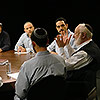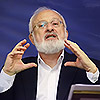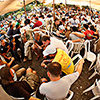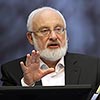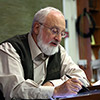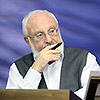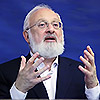 The Zohar says about the verse, “And there was evening and there was morning” (Genesis 3, p 96, and Item 151 in the Sulam Commentary), “‘And there was evening,’ which the text writes, means that it extends from the side of darkness, meaning Malchut. ‘And there was morning’ means that it extends from the side of the light, which is ZA.
The Zohar says about the verse, “And there was evening and there was morning” (Genesis 3, p 96, and Item 151 in the Sulam Commentary), “‘And there was evening,’ which the text writes, means that it extends from the side of darkness, meaning Malchut. ‘And there was morning’ means that it extends from the side of the light, which is ZA.
This is why it writes about them, “One day,” indicating that the evening and morning are as one body, and both make the day (Rabash, “And There Was Evening and There Was Morning”).
The Torah begins with the words “In the beginning” (“Bereshit”). By “beginning” we mean the beginning of a person’s advancement, when he can already distinguish between his ascents and descents. He begins to define more correctly what a descent is in relation to an ascent, what is good in relation to evil, light in relation to darkness.
If he sees that his thoughts are drawing closer to the thoughts of the masses, he defines this as darkness, as evil, even though in his feelings it may seem pleasant or good. Yet he understands that remaining within the thoughts of the masses distances him from spirituality and from the purpose of creation.
Conversely, when he turns inward and finds even some small closeness to the upper force, to the Creator, to a recognition of the value of bestowal, within himself, he defines this as an ascent. But here, too, there are various degrees. A person does not always know which state he is in and remains in it almost unconsciously without the ability to measure it.
Each state begins when a person seemingly observes it from the side and perceives it from an objective perspective that does not depend on him.
In other words, when he acquires the ability to understand his state, and the word “understanding” (Heb. “Havana”) comes from Bina, that is, when there is Bina within Malchut, and he receives some sensation of something higher than ordinary animate life, then two points appear within him. From the difference between them, he examines his state. Now he can discern where good is and where evil is, where truth is and where falsehood is.
If he rises above the sensations of good and evil and is ready to proceed according to the definition of truth and falsehood, then one can say with certainty that he is consciously in states of ascent and descent. Then he may conclude that going within reason may be correct at his present degree, but if he wishes to rise to a higher degree, he must go in faith above reason.
Through this, he acquires intellect, attainment, and closeness to the upper, to a higher degree. At that point, it can truly be said that his path begins to be defined as “In the beginning”: He now has a beginning, he has a head (Rosh), he has a goal, and he is moving toward advancement.
He always sees his present state as darkness, as evening, and strives toward morning, so that there will be one day, and another day, and yet another. Each of his states begins with evening, and whatever it may be, he comes to realize that there is a higher state, one closer to the Creator. Therefore, he defines his current state as evening, and from this he arrives at morning, at the first day, the second, and the third.
[352842]
From the Daily Kabbalah Lesson 2/8/26, Rabash, “And There Was Evening and There Was Morning”
Related Material:
The Basis Of The Spiritual Advancement
The Spiritual Environment Is The Repository Of The Soul
How The Soul Grows
 Question: How can a person determine for himself that it is not the group that needs correction but himself?
Question: How can a person determine for himself that it is not the group that needs correction but himself?

